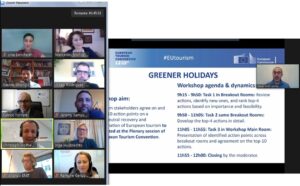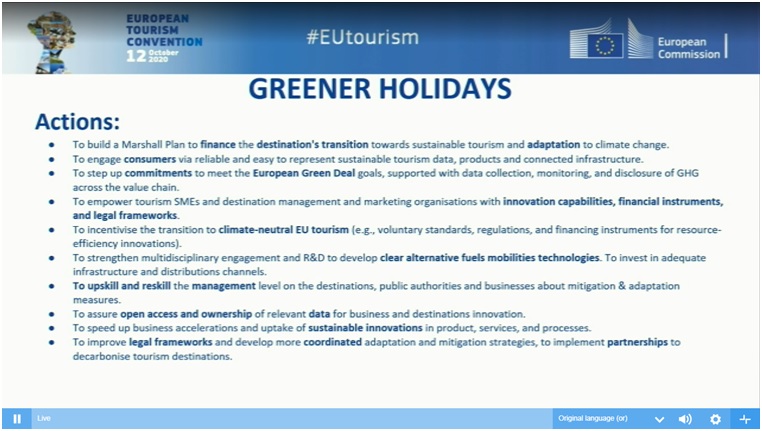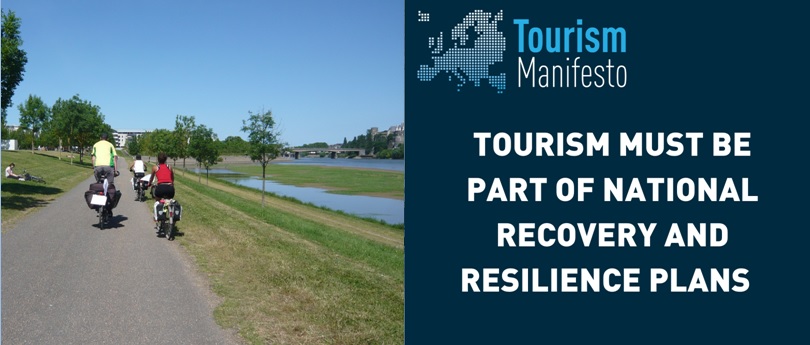
=> Feedback on the European Tourism convention workshop Greener Holidays
=> The plenary session
=> Funding opportunities for tourism & greenways
=> Campaing:Tourism part of National Recovery and Resilience Plans
=> Actions to undertake – Practical recommendations
=> FEEDBACK ON THE EUROPEAN TOURISM CONVENTION WORKSHOP GREENER HOLIDAYS.
 As planned, last Monday 12 October, I took part in the European Tourism Convention workshop “Greener Holidays” it was very positive to be part of the group of experts to contribute proposals for tomorrow’s tourism, and the presence of “Greenways” at the Convention.
As planned, last Monday 12 October, I took part in the European Tourism Convention workshop “Greener Holidays” it was very positive to be part of the group of experts to contribute proposals for tomorrow’s tourism, and the presence of “Greenways” at the Convention.
The objective of the Convention was to launch a dialogue on sustainable recovery , the strategic orientations for the tourism of tomorrow, and to guide future work and cooperation on tourism (towards a European Agenda for Tourism 2050).
The three on-line thematic workshops (and main priorities), running in parallel in the morning of 12th October were:
- Safe and Seamless Tourism Experience,
- Greener Holidays, and
- Tourism Powered by Data
Our workshop “Greener Holidays” was divided into 3 breakout sections:
- To accelerate the decarbonisation towards climate-neutrality by 2050
- To implement climate change mitigation and adaptation measures for more resilient business and destinations.
- To encourage new business models through innovation for sustainable development and a circular tourism economy
I was assigned to the second one. (Climate change mitigation and adaptation measures).
We were asked to collaboratively develop a set of action points, chosen from those initially risen from the written contributions submitted by workshop participants.
Some of the proposals are quite general, which is also logical considering that the tourism ecosystem was addressed as a whole, not thematically.
> Proposal actions from breakout team 2 (Climate change mitigation and adaptation measures):
- To engage consumers via reliable and easy to represent sustainable tourism data, products and connected infrastructure.
- To improve legal frameworks and develop more coordinated adaptation and mitigation strategies and initiatives, so to implement real public-private parnerships for tourism at destination level.
- To upskill and reskill the management level on the destinations, public authorities and businesses levels about mitigation and adaptation measures.
- To build a Marshall Plan to finance the destination’s transition towards sustainable tourism. (further info)
=>See in the image the 10 points considered as priorities of the workshop “Greener Holidays” (including 3 breakout teams).

=>THE PLENARY SESSION
The priorities from the 3 workshop were presented in the plenary, hosted by Commissioner for the Internal Market Thierry Breton, in the afternoon.
Commissioner Breton made clear that the tourism is one of the sectors most affected by the pandemic. (travel and tourism is one of the most affected ecosystems by the COVID-19 and requires € 161 billion worth of investment to bounce back to pre-crisis levels )
He stated the commitment of the EC to help the recovery and transformation of the tourism ecosystem; and that a great emphasis must be placed on SME’s, and the lack of liquidity they suffer. Solving this is absolutely crucial to overpass this deep crisis and enable the recovery of these small business and the long-term job generation; furthermore, there must be a very clear message that no one should be left behind.
>> The vision of the twin objectives: greener and more digital tourism ecosystem has become very clear during the Convention.
And now? The European Commission will prepare the road map now ; the contributions to the Convention will guide the future work and cooperation on tourism (towards a European Agenda for Tourism 2050).
- The video of the plenary is available here
Note: I strongly encourage you to see and hear firsthand the statements and opinions of the representatives of the highest level of the European Commission, of the member countries, from the public and private sector, from Europe and outside, who participated in the plenary.
See also the written statements by EU Member State Ministers with responsibilities for tourism focusing on two questions:
> What are the main challenges for European tourism in the next 10-20 years?
> What investment priorities are necessary for the sustainable recovery and resilience of the EU tourism ecosystem?
=> See the priorities for all the workshops, here; including the votes of the pools that were launched online (Perceived importance of the action points proposed by the workshops.)
=> FUNDING OPPORTUNITIES FOR TOURISM & GREENWAYS
- Greenways are called to become one of the great green tourism offers in Europe; they meet the best conditions for it.
- There are great opportunities to receive EU funds towards tourism through both the National Recovery and Resilience Plans for 2021-2023 (COVID19), and the Regional Operational Programmes for the next period 2021-2027.
- National Recovery and Resilience Plans have to be submitted to the EC between 15 October – April 2021:
- States to make tourism a strategic element in their National Recovery Plans.
- Regions request at national level the inclusion of the tourism as priority of the National Recovery and Resilience Plan, proposing specific actions to be implemented in their territories that clearly contribute to the twin objectives: greener and more digital tourism ecosystem; and reinforce the “economic and social resilience” of EU countries.
- The managers /those responsible of the greenways must propose concrete actions to their reference authorities (departments, counties, CIM’s, regions), so that they can be included in the National Recovery and Resilience plans (2021-2023), and in the Regional Operational Programmes (2021-2027).
- They will need to be consistent with each country-specific recommendations
- See: https://www.consilium.europa.eu/en/policies/eu-recovery-plan/ (9/October 2020)
=> TOURISM MUST BE PART OF NATIONAL RECOVERY AND RESILIENCE PLANS
European campaign launched by the European Manifesto for tourism to stress the necessity to include tourism in National Recovery and Resilience Plans.
If it is not in the plan, it is not in the budget: the European Tourism Manifesto alliance, the voice of the European travel and tourism sector, urges European Union Member States to make tourism a strategic element in their national recovery plans in order to harness the potential of the sector to generate jobs and growth, and to reap the benefits from green and digital transitions.
The new Recovery and Resilience Facility , proposed by the Commission to help the EU rebuilding after the pandemic, offers an unprecedented opportunity to support tourism and to ensure that the sector helps to drive digital and green transitions, and thereby strengthens both economic and social resilience.
Download the full text of the Manifesto Statement
EGWA is part of the European Tourism Manifesto alliance
=> ACTIONS TO UNDERTAKE – PRACTICAL RECOMMENDATIONS
We reiterate the need for managing authorities to request specific actions in tourism and greenways trough the National Recovery and Resilience Plans (2021-2023) as well as in the Regional Operational Programmes (2021-2027).
In the document EU Funding for greenways, in the next Multiannual Financial Framework (2021-2027), there are proposed examples of Indicative actions sustainable tourism / active mobility /greenways related, to be included in the Operational Plans for the next financial period 2021-2027. This kind of actions can also be included in the National Recovery and Resilience Plans (2021-2023), which fits the criteria required.
Use this information as much as possible to request funding for your tourism &greenways projects to your reference authorities.
—————————————
Mercedes Muñoz Zamora,
European Greenways Association, Director; 15/October/2020
Download pdf English Spanish French (coming soon)






